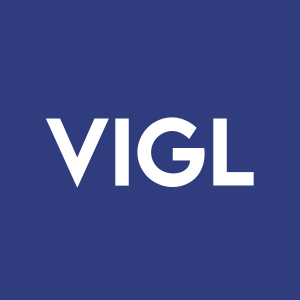Welcome to our dedicated page for Vigil Neuroscience news (Ticker: VIGL), a resource for investors and traders seeking the latest updates and insights on Vigil Neuroscience stock.
Vigil Neuroscience Inc. (VIGL) is a pioneering biotechnology company developing novel therapies that target microglia dysfunction in neurodegenerative diseases. This dedicated news hub provides investors and researchers with timely updates on clinical trials, scientific advancements, and strategic developments.
Access comprehensive coverage of VIGL's progress in Alzheimer's research, rare neurological disorders, and innovative treatment approaches. Our curated collection includes earnings reports, regulatory milestones, partnership announcements, and analysis of therapeutic pipeline developments.
Key updates feature progress on the company's TREM2 agonist programs, monoclonal antibody therapies, and biomarker validation studies. Stay informed about clinical trial phases, research collaborations, and scientific presentations through verified press releases and objective reporting.
Bookmark this page for streamlined access to essential VIGL updates. Combine our news monitoring with SEC filings and investor resources for complete due diligence on this microglia-focused biotech innovator.
Vigil Neuroscience (NASDAQ: VIGL) reported Q3 2024 financial results with a net loss of $19.3 million, compared to $20.5 million in Q3 2023. The company ended Q3 with $111.3 million in cash and equivalents, expecting to fund operations into 2026. R&D expenses decreased to $13.8 million from $15.4 million year-over-year, while G&A expenses remained stable at $6.9 million.
Key developments include planned final analysis of the IGNITE Phase 2 trial for iluzanebart in ALSP in H1 2025, and Phase 1 clinical data for VG-3927 in Alzheimer's Disease expected in Q1 2025. The company also reported new ALSP prevalence estimates of approximately 19,000 cases in the U.S. and 29,000 in EU/UK combined.
Vigil Neuroscience (Nasdaq: VIGL), a clinical-stage biotechnology company focused on developing microglia-based treatments for neurodegenerative diseases, has announced its participation in the Guggenheim Healthcare Innovation Conference. The company's management will engage in a fireside chat on November 11, 2024, at 10:30 a.m. ET. A live webcast will be available for registration and can be accessed through the company's website under the Investors section. The recorded session will remain accessible for approximately 90 days after the event.
Vigil Neuroscience (Nasdaq: VIGL) announced that the FDA has removed the partial clinical hold on its Phase 1 trial of VG-3927, a potential treatment for Alzheimer's disease. The decision was based on non-clinical and clinical data from the ongoing trial. Interim data from July 2024 showed a favorable safety and tolerability profile, predictable pharmacokinetics supporting once-daily dosing, and proof of target engagement. The company has initiated dosing in Alzheimer's patients, including those with TREM2 variants. Vigil plans to report complete Phase 1 data, including results from the AD patient cohort, in Q1 2025.
Vigil Neuroscience (Nasdaq: VIGL), a clinical-stage biotech company focusing on microglia-based treatments for neurodegenerative diseases, has announced its participation in the Cantor Global Healthcare Conference. The company's management will engage in a fireside chat on Thursday, September 19, 2024, at 9:45 a.m. ET.
Interested parties can register for the live webcast through a provided link. The webcast will also be accessible on Vigil Neuroscience's website in the 'Investors' section under 'Events & Presentations'. An archived version of the webcast will remain available for approximately 90 days after the event.
Vigil Neuroscience (Nasdaq: VIGL), a clinical-stage biotech company focusing on microglia-based treatments for neurodegenerative diseases, has announced its participation in two upcoming investor conferences in September 2024:
1. Morgan Stanley 22nd Annual Global Healthcare Conference: A fireside chat scheduled for Thursday, September 5th at 2:35 p.m. ET.
2. H.C. Wainwright 26th Annual Global Investment Conference: Another fireside chat set for Tuesday, September 10th at 10:30 a.m. ET.
Both events will feature live webcasts available on the company's website under the 'Events & Presentations' page in the 'Investors' section. These webcasts will remain accessible for approximately 90 days after the presentations.
Vigil Neuroscience (VIGL) reported Q2 2024 financial results and provided a business update. Key highlights include:
1. A $40 million strategic investment from Sanofi, extending cash runway into 2026.
2. Updated clinical development strategy for iluzanebart, pursuing a potential accelerated approval pathway in ALSP.
3. Interim data from VG-3927 Phase 1 trial supporting continued development for Alzheimer's disease.
4. Q2 2024 financials: $86.7 million in cash and equivalents, $15.5 million in R&D expenses, and $21.2 million net loss.
5. Plans to report final analysis from IGNITE clinical trial in H1 2025 and complete Phase 1 data for VG-3927 in Q1 2025.
Vigil Neuroscience (Nasdaq: VIGL) highlights a new publication in Neurology Genetics on the prevalence of CSF1R gene variants associated with adult-onset leukoencephalopathy with axonal-spheroids and pigmented glia (ALSP). The study suggests ALSP is underreported, with an estimated prevalence of 281 per 1 million in the UK population. This translates to approximately 19,000 cases in the U.S. and 29,000 in the EU and UK, significantly higher than previous estimates. The research indicates there may be over 2 million carriers worldwide. ALSP, a rare neurodegenerative disorder caused by CSF1R mutations, is often misdiagnosed and requires genetic testing for confirmation. This new data emphasizes the need for increased genetic screening and awareness to improve diagnosis and support for ALSP patients.
Vigil Neuroscience (NASDAQ: VIGL) presented data on its small molecule TREM2 agonist program at the 2024 Alzheimer's Association International Conference. The company shared clinical data from single ascending dose (SAD) cohorts in its ongoing Phase 1 trial of VG-3927, demonstrating proof-of-pharmacology with a robust decrease of sTREM2 in the CSF.
Key highlights include:
- In vivo data showing selective activation of downstream function leading to microglial amyloid-beta phagocytosis
- Acute modulation of AD pathophysiology comparable to an approved therapeutic
- In vitro data demonstrating preferential activity on cellular TREM2
- Phase 1 trial design details for VG-3927 in healthy volunteers
- Pharmacological and functional characterization of VG-3927 as a TREM2-specific, highly potent molecule
Vigil believes VG-3927 has the potential to offer a differentiated approach to treating Alzheimer's disease.
Vigil Neuroscience (Nasdaq: VIGL) has announced promising interim data from its ongoing Phase 1 clinical trial of VG-3927, a potential once-daily oral therapy for Alzheimer's disease (AD). The trial, which has enrolled 80 healthy volunteers, demonstrated a favorable safety and tolerability profile, with all adverse events being mild or moderate and resolving without intervention. Key findings include:
1. VG-3927 achieved a robust decrease in sTREM2 in cerebrospinal fluid, indicating clinical proof-of-target engagement.
2. The drug showed a predictable pharmacokinetic profile supporting once-daily dosing.
3. An increase in osteopontin/SPP1, a biomarker associated with neuroprotective microglia, was observed after repeat dosing.
Vigil plans to report complete Phase 1 data, including results from an AD patient cohort, in Q1 2025. The company will present new preclinical and clinical data at the upcoming 2024 Alzheimer's Association International Conference.
Vigil Neuroscience (Nasdaq: VIGL) announced three presentations on its small molecule TREM2 agonist VG-3927 at the 2024 Alzheimer's Association International Conference (AAIC) in Philadelphia. The presentations include:
1. An oral presentation on the characterization of VG-3927 for clinical development in Alzheimer's disease.
2. A poster on the design of a Phase 1, first-in-human study of VG-3927 in healthy volunteers.
3. A poster on the pharmacological and functional characterization of VG-3927 for Alzheimer's treatment.
These presentations highlight Vigil's progress in developing VG-3927 as a potential treatment for Alzheimer's disease, showcasing the company's focus on harnessing microglia for neurodegenerative diseases.


